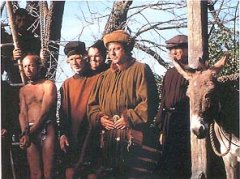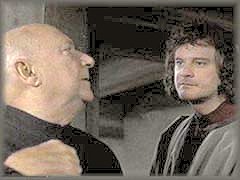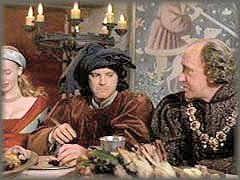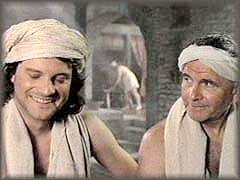Nan:
Today we begin the discussion of the lanky lawyer and his porky pal.
But I still have no idea who those people are on the front cover
;-) [Ed. Note: US cover of The Advocate]
Laura:
To start with, I think Richard Courtois had a great butt and Ian Holm
was hysterical. HBO said it was a quirky legal thriller. The only thing
that I didn't like was the rushed ending; there really was no climax. And
I didn't think Samira was all that attractive. Usually I like Lysette Anthony,
but she was too hyena-ish in this role.
What did he say to her after she asks him to stay inside her? What did
they call him, Matra?
Here is Roger Ebert's review when it first came out (September 2, 1994):
 There
was a time in the Middle Ages, so "The Advocate" informs us, when animals
were held accountable to the same laws as men, and could be brought into
court, tried, and sentenced. The film opens, in fact, with a man and his
donkey standing on a gallows, being prepared to die for a crime against
nature. Because of a last minute appeal, luckily, the donkey goes free. There
was a time in the Middle Ages, so "The Advocate" informs us, when animals
were held accountable to the same laws as men, and could be brought into
court, tried, and sentenced. The film opens, in fact, with a man and his
donkey standing on a gallows, being prepared to die for a crime against
nature. Because of a last minute appeal, luckily, the donkey goes free.
That scene more or less sets the tone for "The Advocate," a quirky British
film that seems to aim halfway between Monty Python and "Sommersby." The
hero is Richard Courtois (Colin Firth), who after becoming a lawyer in
Paris journeys out to the provinces to set up shop in the hamlet of Abbeville.
He seems a curiously modern lawyer, more Perry Mason than medieval, as
he tries to use logic against a crusty old magistrate whose primary interest
is to see that things are done exactly as they always have been done. The
times seem precariously balanced between ancient and modern. The district
is ruled by a Seigneur (Nicol Williamson), who lives in the local castle
and holds court and has things his way. But on the other hand, he is not
a hereditary lord, and is happy to explain to Courtois that he made a bundle
in business, and bought his lands and the title that went with it. And
he has his problems, chief among them marrying off his daughter, Filette
(Lysette Anthony), who is 20, and therefore long in the tooth, marriage-wise.
"I know she brays like a she-ass, but she's got good, sweaty flesh on her,"
the Seigneur assures the lawyer. Courtois is not much interested. His eye
has been caught by a buxom Gypsy lass named Samira (Amina Annabi), who,
like all independent women of the time, lives in permanent danger of being
burned as a witch. She is passionate and of good humor, two attributes
important to the lawyer—and she has a nice moment when she screams what
sounds like an evil ancient curse, and then later confesses it was only
a gypsy nursery rhyme. Delivery is everything. In the course of the movie,
Courtois will be called upon to defend not only Samira, but also another
local woman accused of witchcraft, and various other clients, including
a pig and some rats.
 He
does his best. And the movie does its curious best, too; without quite
declaring itself a satire or a comedy, it works in a great deal of sly
humor, as in the exchanges between Courtois and his law clerk (Jim Carter),
who understands the town a great deal better than his boss does. Nicol
Williamson, too rarely seen in the movies, has a great magisterial vulgarity
as the Seigneur, reducing everything and everyone to his own piggish tastes. He
does his best. And the movie does its curious best, too; without quite
declaring itself a satire or a comedy, it works in a great deal of sly
humor, as in the exchanges between Courtois and his law clerk (Jim Carter),
who understands the town a great deal better than his boss does. Nicol
Williamson, too rarely seen in the movies, has a great magisterial vulgarity
as the Seigneur, reducing everything and everyone to his own piggish tastes.
And it was good to see Donald Pleasence again, as the local prosecutor.
Pleasence was a mainstay of British horror movies in the 1960s and 1970s
(and of most of the "Halloween" pictures), and exudes a certain air of
conspiratorial menace that is all the more unsettling when he's on the
side of the law.
 "The
Advocate" is a hard film to categorize, which may be why its distributor,
Miramax, has worked overtime, first to publicize an argument with the always
helpful MPAA ratings board, and then with an ad campaign begging audiences
not to reveal the "secret." That was a legitimate gimmick when Miramax
was protecting the secret of "The Crying Game," but how crucial can a secret
be in a film which was released in England as "Hour of the Pig," more or
less revealing all that Miramax would conceal? "The Advocate" doesn't depend
on sex or secrets for its charm, but earns it on its own. "The
Advocate" is a hard film to categorize, which may be why its distributor,
Miramax, has worked overtime, first to publicize an argument with the always
helpful MPAA ratings board, and then with an ad campaign begging audiences
not to reveal the "secret." That was a legitimate gimmick when Miramax
was protecting the secret of "The Crying Game," but how crucial can a secret
be in a film which was released in England as "Hour of the Pig," more or
less revealing all that Miramax would conceal? "The Advocate" doesn't depend
on sex or secrets for its charm, but earns it on its own.
Renate:
The Porker is a Corker....that is what the video cover of "The
Hour of the Pig" says.
Karen:
(Laura) What did they call him, Matra?
Not having taken French, I think the word is maitre as in a maitre
d'. A title of respect, meaning master. It might have come from the guilds
in that one apprentices to a craft/trade and then becomes a master. But
then again, it could be something completely different. ;-)
(Ebert) a quirky British film that seems to aim halfway between Monty
Python and "Sommersby."
You see, even Roger knew it was a satire. HBO and my video store lumped
it in the thriller category. Whatsamatta with these people?
 (Ebert)
a Seigneur...has his problems, chief among them marrying off his daughter..."I
know she brays like a she-ass, but she's got good, sweaty flesh on her,"
the Seigneur assures the lawyer. (Ebert)
a Seigneur...has his problems, chief among them marrying off his daughter..."I
know she brays like a she-ass, but she's got good, sweaty flesh on her,"
the Seigneur assures the lawyer.
So judicious in his quotes. Too bad he didn't bring up the next line
about the condition of her hams! ;-)
(Ebert) it works in a great deal of sly humor, as in the exchanges
between Courtois and his law clerk (Jim Carter), who understands the town
a great deal better than his boss does.
Yeah, he doesn't even know he's living in the town's brothel! I do
love all the interchanges with Mathieu. A riot!
What bugs me about Roger's review is that he never mentions Colin's
performance. What is going on? He mentions everyone else.
Laura:
I do love this movie. It was actually given an NC-17 rating as The
Hour of the Pig, but finally released with an R rating for The Advocate.
The Porker is a Corker? I don't get it.
Lucie:
I get the feeling that Colin is having a good time making the movie.
He has a twinkle in his eye most of the time. I have to laugh when he finds
that they have been staying in the local house of ill repute.
 At
the end when he tells Samira that he loves her, he doesn't sound too convinced
to me, a feeling which is strengthened by the way he starts to ogle the
girl in the wagon on his way back to Paris. I think that Samira was right.
He was in love with the idea of loving her. At
the end when he tells Samira that he loves her, he doesn't sound too convinced
to me, a feeling which is strengthened by the way he starts to ogle the
girl in the wagon on his way back to Paris. I think that Samira was right.
He was in love with the idea of loving her.
Arami:
(Laura) What did he say to her after she asks him to stay inside
her
"Thou are black but (- - ?) my sister, my wife..." (Bloody music is
too loud.)
(Laura) I didn't think Samira was all that attractive
Exotic, persecuted and brainy, she was sufficiently alluring to someone
like Richard.
(Karen) maitre...A title of respect, meaning master
Medieval Europe wasn't all that savage, you know, and to become a lawyer
one had to study at a university. Maitre denotes a holder of an M.A. degree.
(Renate) The Porker is a Corker
The slogan means that the pig is excellent.
Marcia:
From Solomon, Old Testament: "comely" is the word you are missing.
Beautiful, it means. He was rhapsodizing to Sheba, I believe.
BTW, the Advocate is the most comely in the entire production, but I
am biased.
Heide:
 Considering
the Advocate was one of the few characters who had all his teeth, I'd have
to agree he was the most comely. Did they really overdo it showing us how
vulgar, earthy, simple and uncouth the locals were? I mean, that play at
the beginning. Speaking of teeth, we see Richard's quite a bit. My favorite
is one of the courtroom scenes where Donald Pleasence says, "the pig ate
a portion of his body although it was Friday" and Colin (sorry, Richard)
says Wot?" and Donald explains the Christian ordinance this violates. Richard
gives such a cute bark of a laugh and then looks sheepish. Love it. Oh
no, perhaps my favorite smile is in the bath when he reacts to Ian Holm's
disbelief that he didn't have sex with Samira. Considering
the Advocate was one of the few characters who had all his teeth, I'd have
to agree he was the most comely. Did they really overdo it showing us how
vulgar, earthy, simple and uncouth the locals were? I mean, that play at
the beginning. Speaking of teeth, we see Richard's quite a bit. My favorite
is one of the courtroom scenes where Donald Pleasence says, "the pig ate
a portion of his body although it was Friday" and Colin (sorry, Richard)
says Wot?" and Donald explains the Christian ordinance this violates. Richard
gives such a cute bark of a laugh and then looks sheepish. Love it. Oh
no, perhaps my favorite smile is in the bath when he reacts to Ian Holm's
disbelief that he didn't have sex with Samira.
 I
love the scenes with the Seigneur and with Filette. Their little charming
exchange when he is first introduced to her is a hoot. "The cell I would
put him in is warm indeed and he would never want to come out again." I
love the scenes with the Seigneur and with Filette. Their little charming
exchange when he is first introduced to her is a hoot. "The cell I would
put him in is warm indeed and he would never want to come out again."
I agree, Karen, you'd have to call this movie a satire (church vs. state?).
It's not a true comedy, though I laughed a lot, but a thriller? I've seen
it categorized that way too. I admit the very first time I saw it I thought
Richard may have been in trouble when he was found spying on the Seigneur's
little group, but of course now we all know it was part of the comedy of
it.
Of course Richard is a very likable character, a noble man. I like that
he was able to give the woman accused of witchery her dignity back.
He had his Darcy walk going for him when he barged into the castle to
tell the Seigneur that he knew his son had killed the boy.
 Loved
the boots, hated the hair. Loved the stubble he had almost constantly.
There's one shot of him at night leaning over the balcony just before he
turns back to his room to find Samira there. It's shot from below so you
really see his strong jaw and the wind is blowing his hair. Yum. Loved
the boots, hated the hair. Loved the stubble he had almost constantly.
There's one shot of him at night leaning over the balcony just before he
turns back to his room to find Samira there. It's shot from below so you
really see his strong jaw and the wind is blowing his hair. Yum.
Marcia:
I loved his cheeks—all of them—and his "Wottage." There isn't a movie
of his that I've seen without one of them. I like that! However, the rubber
hair: terrible. But he was delightful and eminently watchable, was he not?
Arami:
(Marcia) From Solomon, Old Testament: "comely"...He was rhapsodizing
to Sheba
I've looked into this and found pieces scattered round The Song Of
Solomon: "I am black, but comely..." Chapter 1, verse 5, and "my sister,
my spouse" several times in Chapters 4 and 5.
Karen:
(Arami) Medieval Europe wasn't all that savage, you know, and to
become a lawyer one had to study at a university. Maitre denotes a holder
of an M.A. degree.
Oh, where did I put Barbara Tuchman's A Distant Mirror? Strange,
though, that one didn't even need a university degree to be a lawyer in
19th century England. Now the barrister/advocate type usually did, but
all one really had to do was study at the Inns of Court. Could it be that
the master's terminology came from the trades, interesting thought.
Kate, could you look that up in the law lib?
(Heide) My favorite is...where Donald Pleasence says, "the pig ate
a portion of his body although it was Friday" and...Richard gives such
a cute bark of a laugh and then looks sheepish.
So did I. That "Wot" and the full-toothed grin wonderfully showed the
complete and utter absurdity of the charge. I get the biggest kick out
of that scene.
Speaking of teeth, how about the smiling dog? How did the wrangler get
the dog to do that? I know about peanut butter, but not a grin like that!
Many little bits reminded me of P&P. When he is talking to Jeannine
Martin, the witch, and says "I want her dressed now," for some reason,
it sounded like a few of his more impatient lines in P&P. Then, when
he counsels Jeannine, he says, "Trust me, it's an arrangement," it reminds
me of when he asks Elizabeth if she likes Pemberley. Strange, huh?
Most importantly, he does a Look. Now, who else saw it?
 Laura: Laura:
In bed with Samira. The look. I melted.
Karen:
Half credit. Which half?
Arami:
Lawyer vs barrister/advocate
The difference in these terms is a little vague for a non-native English
speaker. Lawyer in the English sense is best described as a notary or a
legal adviser. Courtois is a barrister, of course.
(Karen) Could it be that the master's terminology came from the trades,
interesting thought.
As far as I can remember, it comes from the Latin "magister," a polite
way to address a teacher. For example, the Apostles address Jesus as "Master,"
which is often translated into various languages as "Teacher." |
 There
was a time in the Middle Ages, so "The Advocate" informs us, when animals
were held accountable to the same laws as men, and could be brought into
court, tried, and sentenced. The film opens, in fact, with a man and his
donkey standing on a gallows, being prepared to die for a crime against
nature. Because of a last minute appeal, luckily, the donkey goes free.
There
was a time in the Middle Ages, so "The Advocate" informs us, when animals
were held accountable to the same laws as men, and could be brought into
court, tried, and sentenced. The film opens, in fact, with a man and his
donkey standing on a gallows, being prepared to die for a crime against
nature. Because of a last minute appeal, luckily, the donkey goes free.
 He
does his best. And the movie does its curious best, too; without quite
declaring itself a satire or a comedy, it works in a great deal of sly
humor, as in the exchanges between Courtois and his law clerk (Jim Carter),
who understands the town a great deal better than his boss does. Nicol
Williamson, too rarely seen in the movies, has a great magisterial vulgarity
as the Seigneur, reducing everything and everyone to his own piggish tastes.
He
does his best. And the movie does its curious best, too; without quite
declaring itself a satire or a comedy, it works in a great deal of sly
humor, as in the exchanges between Courtois and his law clerk (Jim Carter),
who understands the town a great deal better than his boss does. Nicol
Williamson, too rarely seen in the movies, has a great magisterial vulgarity
as the Seigneur, reducing everything and everyone to his own piggish tastes.
 "The
Advocate" is a hard film to categorize, which may be why its distributor,
Miramax, has worked overtime, first to publicize an argument with the always
helpful MPAA ratings board, and then with an ad campaign begging audiences
not to reveal the "secret." That was a legitimate gimmick when Miramax
was protecting the secret of "The Crying Game," but how crucial can a secret
be in a film which was released in England as "Hour of the Pig," more or
less revealing all that Miramax would conceal? "The Advocate" doesn't depend
on sex or secrets for its charm, but earns it on its own.
"The
Advocate" is a hard film to categorize, which may be why its distributor,
Miramax, has worked overtime, first to publicize an argument with the always
helpful MPAA ratings board, and then with an ad campaign begging audiences
not to reveal the "secret." That was a legitimate gimmick when Miramax
was protecting the secret of "The Crying Game," but how crucial can a secret
be in a film which was released in England as "Hour of the Pig," more or
less revealing all that Miramax would conceal? "The Advocate" doesn't depend
on sex or secrets for its charm, but earns it on its own.
 (Ebert)
a Seigneur...has his problems, chief among them marrying off his daughter..."I
know she brays like a she-ass, but she's got good, sweaty flesh on her,"
the Seigneur assures the lawyer.
(Ebert)
a Seigneur...has his problems, chief among them marrying off his daughter..."I
know she brays like a she-ass, but she's got good, sweaty flesh on her,"
the Seigneur assures the lawyer.
 At
the end when he tells Samira that he loves her, he doesn't sound too convinced
to me, a feeling which is strengthened by the way he starts to ogle the
girl in the wagon on his way back to Paris. I think that Samira was right.
He was in love with the idea of loving her.
At
the end when he tells Samira that he loves her, he doesn't sound too convinced
to me, a feeling which is strengthened by the way he starts to ogle the
girl in the wagon on his way back to Paris. I think that Samira was right.
He was in love with the idea of loving her.
 Considering
the Advocate was one of the few characters who had all his teeth, I'd have
to agree he was the most comely. Did they really overdo it showing us how
vulgar, earthy, simple and uncouth the locals were? I mean, that play at
the beginning. Speaking of teeth, we see Richard's quite a bit. My favorite
is one of the courtroom scenes where Donald Pleasence says, "the pig ate
a portion of his body although it was Friday" and Colin (sorry, Richard)
says Wot?" and Donald explains the Christian ordinance this violates. Richard
gives such a cute bark of a laugh and then looks sheepish. Love it. Oh
no, perhaps my favorite smile is in the bath when he reacts to Ian Holm's
disbelief that he didn't have sex with Samira.
Considering
the Advocate was one of the few characters who had all his teeth, I'd have
to agree he was the most comely. Did they really overdo it showing us how
vulgar, earthy, simple and uncouth the locals were? I mean, that play at
the beginning. Speaking of teeth, we see Richard's quite a bit. My favorite
is one of the courtroom scenes where Donald Pleasence says, "the pig ate
a portion of his body although it was Friday" and Colin (sorry, Richard)
says Wot?" and Donald explains the Christian ordinance this violates. Richard
gives such a cute bark of a laugh and then looks sheepish. Love it. Oh
no, perhaps my favorite smile is in the bath when he reacts to Ian Holm's
disbelief that he didn't have sex with Samira.
 I
love the scenes with the Seigneur and with Filette. Their little charming
exchange when he is first introduced to her is a hoot. "The cell I would
put him in is warm indeed and he would never want to come out again."
I
love the scenes with the Seigneur and with Filette. Their little charming
exchange when he is first introduced to her is a hoot. "The cell I would
put him in is warm indeed and he would never want to come out again."
 Loved
the boots, hated the hair. Loved the stubble he had almost constantly.
There's one shot of him at night leaning over the balcony just before he
turns back to his room to find Samira there. It's shot from below so you
really see his strong jaw and the wind is blowing his hair. Yum.
Loved
the boots, hated the hair. Loved the stubble he had almost constantly.
There's one shot of him at night leaning over the balcony just before he
turns back to his room to find Samira there. It's shot from below so you
really see his strong jaw and the wind is blowing his hair. Yum.
 Laura:
Laura: